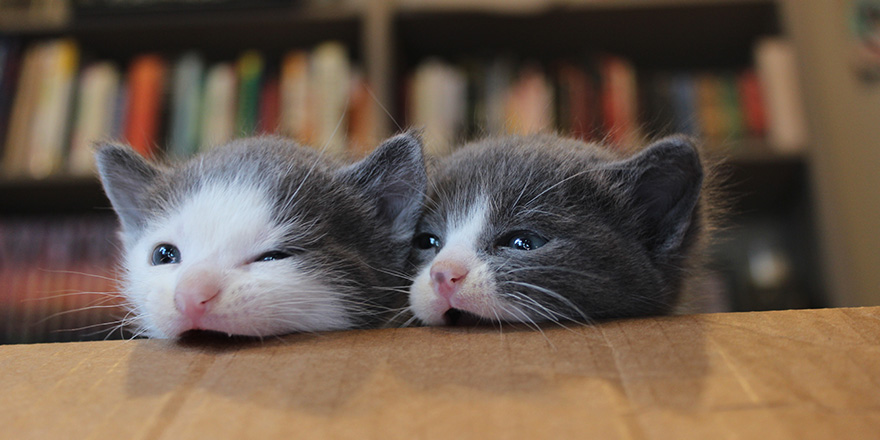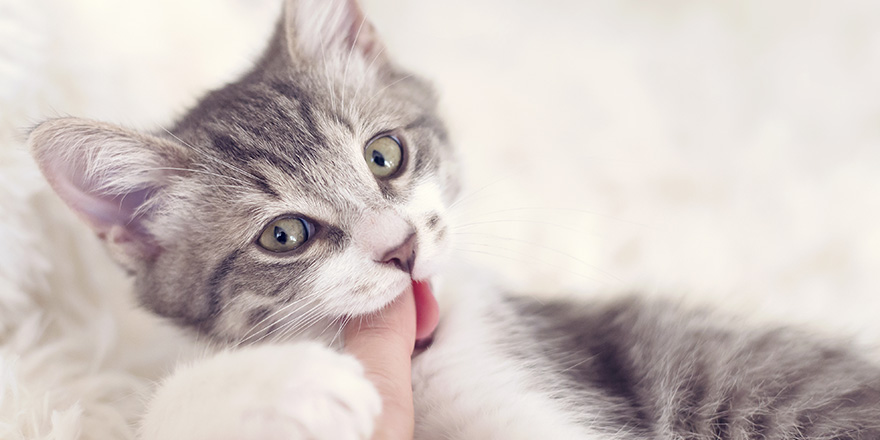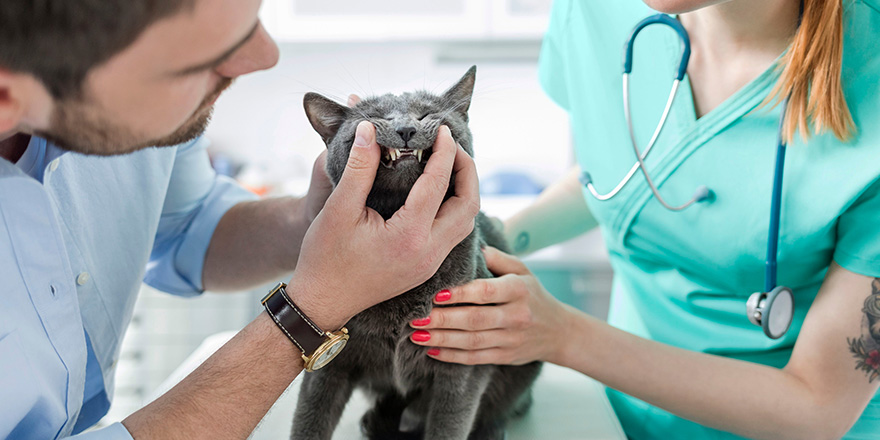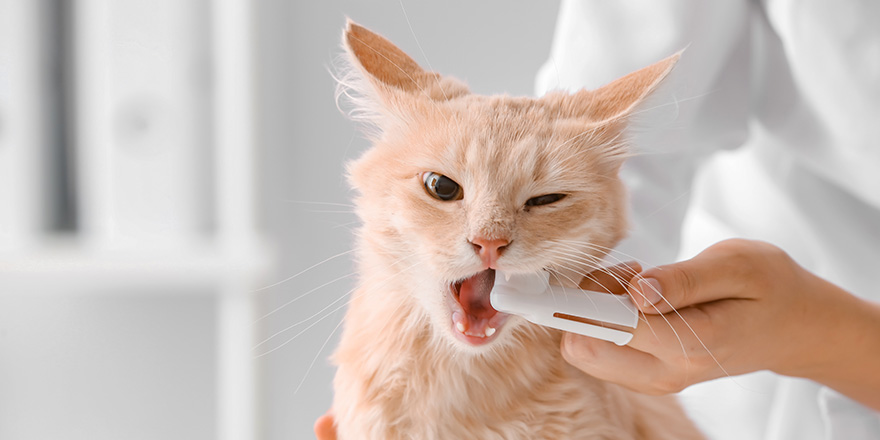When you’re a cat parent, and your sweet little furry baby starts teething, you can’t help but feel sorry for them. We’ve all been there, and the pain of teething is not something that’s easy to endure. A teething kitten may become irritable, needy, mouthy, or even noisy when their milk teeth are starting to cut in, and all you want to do is soothe their pain. Well here are a few techniques you can use to try and help your teething kitten and their sore gums.
How to Know When a Kitten is Teething

When you want nothing more than to make your baby cat feel better, you will do anything to help. Being able to recognize the signs of teething and knowing their teething timeline can be of massive assistance when the situation arises.
When Will My Kitten Start Teething?
In the initial life stage, a kitten’s baby teeth will start to come through around 2-4 weeks of age, this is when you should start preparing some method of pain relief.
How to Recognize Teething
Kittens will likely exhibit at least one, if not several of the following symptoms once their baby teeth start pushing their way through their gums. If you keep an eye out for them, you can know when you help them:
- Irritability: When a kitten is teething they may become irritable, this can begin when they are around 2 weeks of age. Understandably they are grumpy because their mouth and gums are very sore.
- Reduced Appetite: As you’d expect a teething kitten is not likely to feel particularly hungry, when even the softened kitten food is hurting their mouth.
- Excessive Drooling: Due to the pain, they will be unlikely to want to close their mouth, and so significant drooling is a real possibility.
- Whining: This is not something you imagine a cat doing, however, they may mew and whine in response to their discomfort, much like how human babies cry.
- Face Sensitivity: If you are trying to stroke them but they pull away or not seem to enjoy you touching their face, it is likely that the pressure irritates their mouth.
- Slight Bleeding Gums: As to be expected when something sharp is pushing through the gums, it can cause mild bleeding, you may see spots on their cat toys or in their water or food bowls.
- Increased Chewing: By chewing on something, it can help to ease some of the pressure they are feeling.
- Decreased Grooming: When they are just not feeling themselves they will likely stop grooming as much, due to being preoccupied with their discomfort.
- Pawing at the Mouth: You kitten may also shake their head frequently, this is often a sign that they are trying to dislodge a couple of deciduous teeth.
- Missing Teeth: Kittens teeth falling out around 11 weeks old is completely natural, do not worry. You may find your kitten lost a tooth on the floor, or they can also swallow them, this will not harm them.
How To Help Your Teething Kitten

There are several ways that you could look to help your kitty get through those first few months
Redirect Aggressive Play and Chewing
A kitten going through the teething phase will likely become mouthy and play more aggressively due to their agitated state. When it comes to this, it is best to try and redirect this energy to something made for the task. This will also help you to avoid having a cat that bites at a later age.
Specially design teething toys are created specifically to help alleviate your kitten from their discomfort, and fortunately, teething toys are available almost everywhere. These kitten toys are often made using pet-safe rubber, rope or soft plastics, this will help them to release some of the pressure they’re feeling.
A home-made alternative to store-bought teething toys would be something like a cold, wet washcloth. Something like this would be a fun interaction for them to enjoy, whilst being soft and soothing on their painful gums. Freezing a wet washcloth before giving it to your kitty will provide an extra cooling element that they are guaranteed to love.
If they are seeming agitated and aggressive, you could provide them with a more high energy interactive cat toy to help them to vent their frustration.
Look at Their Diet
It can be difficult to know what to feed your kitten when their appetite is low, and so the best thing to look out for is a food made specifically for their life stage that can provide a dense supply of nutrients and carbohydrates to help keep their energy and weight levels up as they grow. Often people find that softer food encourages their kitty to eat more owing to lack of difficult textures, where dry food can prove potentially painful for them.
Additionally, cat milk will help to encourage your kitten to eat, and will provide them with additional calcium, nutrients, and calories to encourage healthy weight gain and bone growth.
Weekly Dental Check
There are several complications that can arise during a cat’s teething cycle that are worth keeping an eye out for, this is done by gently looking into your kitten’s mouth weekly to check if you can see any abnormalities. A baby tooth that refuses to be dropped could cause complications with their adult teeth, so if you see one that isn’t moving contact your vet for advice, as it may need to be extracted.
Problems That May Require a Vet

There are not too many problems that would require a veterinarian’s attention, however, if you notice any of the following symptoms during your weekly checkups, then it is worth giving them a call for further advice.
- Baby teeth stuck in the way of adult teeth: If the baby teeth are not falling out and are still in when the adult teeth start to come through they can cause the new tooth to crack or become misaligned. A way to recognize this if you’re not sure on the difference between the adult and baby teeth is to look for overcrowding, there they may appear to have 2 rows of teeth, it is likely that the milk tooth has been pushed back.
- Infection: If their gums and mouth seem to become inflamed, or very red, or more severely if they seem to be having discharge coming from their gums, it will require veterinary treatment to clear the infection.
- Abnormal behavior: You will know your cat better than anyone. Aside from the typical symptoms of teething, if you are worried that your cat seems especially upset or is acting strangely, do not be embarrassed to call your vet for a little advice.
The 6 Month Checkup
When your kitten reaches around six months old, even if you haven’t noticed any problems watching their milk teeth come through, it is still worth booking a preliminary appointment with your vet around the 6 month mark for a final check before the permanent set has fully come through.
Your veterinarian will have several things that they will need to check for to ensure that your feline friend is ready for their grown up teeth:
- Misalignment: This is probably the most common issue experienced with a kitten teething. Some deciduous teeth may get stuck and cause the adult teeth beneath to grow in at a bad angle or crack, this is usually treated with a simple extraction procedure.
- Tartar and Plaque: A build-up of either of these things can cause several dental complications later in life, it is best to keep on top of dental care from the off.
- Gum Disease: Due to the exposed nature of teething, it can, unfortunately, result in gum disease such as gingivitis another simple fix when caught early.
The Importance of Oral Hygiene

Dental hygiene is imperative with all species to keep them happy and healthy, humans included! Dental disease is unfortunately common among cats, but you can keep the risk if it developing to a minimum, by making a point of taking care of their teeth from the start.
Keeping a routine is the best way to ensure that their teeth and gums stay happy and healthy is the perfect way to maintain their dental health. When establishing your routine, it is best to begin once the kitten teething cycle has concluded (around 6-7 months), this will avoid any needless discomfort for your kitty, and will also avoid negative association with the activity, making both your lives easier later.
Your dental care routine with your kitty should include daily brushing, and regular checkups with your vet, in order to avoid the possibility of their developing periodontitis, gingivitis, or tooth resorption.
You May Also Like: Cat Toothbrush and Cat Toothpaste
Do Cats’ Teeth Fall Out?
No, they shouldn’t. Adult cats with a full set of teeth should not be losing any more. Their permanent set of teeth should be cared for and kept healthy in order to prevent this from happening, and if you should notice that your cat’s teeth are coming away, or that they have particularly bad breath for a prolonged period of time, it would be best to contact your vet to arrange a dental checkup to determine the cause.
Source:
- 10 Facts You Need To Know To Protect Your Pet’s Oral – American Animal Hospital Association
Frequently Asked Questions
Yes, it is the most common form of teething relief. Kitten teething is a difficult phase for them, especially when they are learning about the world around them and how to grow into a fully-fledged cat. Kittens will bite as they are learning their boundaries and when they play as well as biting to alleviate some of the pain they will be experiencing and their new teeth grow.
A cat's teeth are constantly growing in the first six months of their life. The baby teeth will have all grown in by around eight weeks.
Reduced appetite is very common during kitten teething. Kittens will be preoccupied as their first set of teeth are growing in, and will be discouraged when it comes to eating, due to their discomfort. This is where assessing their diet to find the best way to keep them nourished very much comes into play.
Once your kitty gets to around 5 weeks of age, they may start chewing things such as furniture or even electrical cords. This is because the shape and texture of a cord is perfect for slotting in between their teeth and massaging their gums, and a kitten teething chews anything if it feels good. However, as I'm sure you're aware, this can be destructive and isn't exactly a safe thing for them to be doing.
The best thing to do in this instance would be to purchase protective plastic covers that are designed to deter this behavior and stop pets from chewing on electrical cords. You can also purchase cat deterrent sprays to protect your furniture.
Read here our article on the Best Cat Deterrent.
Try to redirect the chewing to a toy rather than encouraging them to use your hand, however perhaps allowing them to chew on clean fingers once in a while will give you the opportunity to feel how their teeth are coming along. Around six weeks of age they will be right in the midst of getting their baby teeth through, so be aware that they will become quite agitated and more likely to bite, so be sure to keep on top of redirecting that behavior wherever possible using cat toys and other play objects.
A kitten's permanent teeth will have grown by 7 months of age, and all being well they should be straight, strong, and healthy. You will no longer have to worry about their pain or the teeth falling out. Their first adult tooth is likely to make an appearance around 3-4 months of age, this is when they will get their canine teeth, their adult cats teeth will make them capable of eating more solid foods, which will help their dental hygiene.
A kitten's teeth will usually come dislodged during playtime and will, for the majority of the time, end up stuck in their toys, carpets, rugs, or furniture. They are sometimes swallowed, but this is not very often and should not pose any problems for your cat, so do not worry, it is a natural occurrence.






